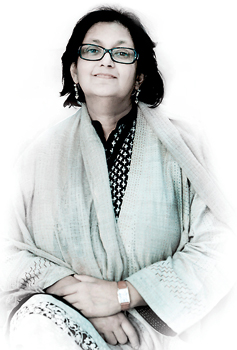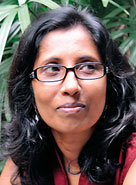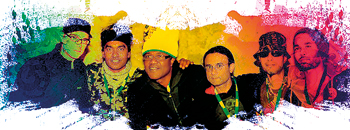Looking into our own mirror again
Namita Gohkhale chooses to give her speech sitting down but makes up for it by delivering an engaging and interesting talk. Considering there is a strike on, the small auditorium in the Colombo University building is surprisingly full. There are perhaps 40 people in the audience – about the number, Namita estimates, that attended some of the earliest sessions of the Jaipur Literary Festival. The Indian author co-founded and directs the Festival with the writer William Dalrymple, and the mightiness of their combined clout is one explanation for how in the years between then and now, 16 authors have swelled to over 200 and audiences have multiplied exponentially, until in 2011 the festival welcomed an estimated 120,000 people over the course of its five day run.

An entirely democratic festival: The audience at Oprah Winfrey’s session at Jaipur 2012. Pic by Aamina Nizar
It has been dubbed ‘The Greatest Literary Show on Earth’ – and everyone gets in for free. While inhabitants of the gloriously beautiful and historic host city flock to the festival, the majority of visitors come from outside. They pay for transport and accommodation and it’s what makes Namita certain they would be willing to pay to attend the festival as well. “It being free is important,” she concedes during a quick post-speech interview, “but even more important than the free part, is that it is an entirely democratic festival. There are no V.I.Ps, there is no special seating. For a society like India when they see a cabinet minister or a chief minister or important people just sitting on the floor listening, they get a shock.” Famous writers who attend – and there are plenty of those – are offered no remuneration. There isn’t even the perk of a business class airplane ticket or a cordoned off room for writers at the festival.
Though Oprah Winfrey probably opted for her private plane anyway, the democracy extends to the programming at the festival says Namita. Though they aren’t written about in the Paris Review, Namita knows they’ve welcomed some of the finest minds working in Indian literature today. “A writer from tribal India, a writer without a background, a writer who has never been heard of before, she is on the same platform as a Nobel prize winner and everybody respects that because the quality of the writing is what matters not the level of international acceptance,” says Namita. Writers working in their own regional languages find rich representation at the festival (Dalrymple has previously described it as “two-thirds desi”) as do writers like OP Valmiki, Bama and Gogu Shyamala who draw from their experiences as part of the marginalised group of ‘untouchable’ Dalits. “Dalits have been using language as a very vital method of assertion and Dalit literature is one of the most powerful literatures in English,” Namita says.
Her ability to give an otherwise unknown writer the spotlight on one of the biggest stages in India makes Namita a heavyweight in Indian literary circles. In addition, she has her own imprint on Roli books and is the author of six novels and two works of nonfiction. They’re still talking about her first book, ‘Paro: Dreams of Passion,’ (1984). She remembers at school, her children were told by a teacher “Your mother writes dirty books!” All the social opprobrium didn’t stop her from revisiting some of those themes in her novel ‘Priya: In Incredible Indyaa’ and more recently in ‘The Habit of Love’ published in 2012.

Namita: Determined to honour India’s multilingual literary heritage
Her real legacy though might be her determined attempt to honour India’s multilingual literary heritage. She is a member-secretary of Indian Literature Abroad (ILA), an initiative by the Ministry of Culture, Government of India, which takes for its mandate the translation of contemporary literature from the Indian languages into the major international languages, in particularly the six UNESCO languages (English, French, Arabic, Spanish, Russian and Chinese).
“There used to be this disdain reserved for what was called the vernacular literatures,” Namita said in her speech, explaining that the decision to put writers on the same footing at the literary festival was an easy one. “In the literary space we are all practitioners of the same art and as for this caste system of languages – it’s time it moved out.”
She’s committed to this course because despite her love of the language, Namita has deep reservations about English as a literary medium in India. She shares the concerns of the academic Priyamvada Gopal who said: “Should a language that is still restricted to 6% of India’s population, an English educated elite, be invested in such global representational power in literary and cultural terms? What does it mean that the world reads and believes it comprehends India through Rushdie and Roy rather than Kamleshwar (Hindi), Ambai (Tamil) or Qurrutalain Hyder (Urdu)?” Namita says that the proliferations of translations of works written in Indian English are beginning to “challenge the sanctioned ignorance” of the sub-continent’s numerous other literary languages.
Rushdie comes up more than once in Namita’s talk and she asks to see any quote I might use with his name in it because the author of ‘The Satanic Verses’ is such a subject of controversy. “It just gets out of control,” she says, a phrase she repeats when talking of the hullaballoo that accompanied their attempts to have Rushdie at the festival this year. The author first pulled out after the authorities warned him of a possible assassination attempt. He later questioned their veracity as did his fans who were disappointed when a scheduled appearance over video link was also cancelled at the last minute after the Jaipur police warned the organisers that violence and riots would ensue, putting thousands of festival- goers at serious risk.
For her part, Namita says the controversy had its silver lining. “While we felt really sad that Rushdie could not come he did in fact give a brilliant interview to Barkha Dutt which was widely broadcast and it became a very important, passionate national debate on free speech…The issue of free speech was central to the fact that Rushdie should be able to attend any literature festival anywhere he wants in the world. This was denied to him, so that issue became much more visible by his absent presence.”
The Festival is likely to draw even larger crowds when it is next held in 2013.Namita, who was in Sri Lanka to deliver a series of talks as part of the Distinguished Visitors’ Programme of the India-Sri Lanka Foundation, says she is looking forward to a series of conversations around the theme of ‘The Buddha in Literature’ – “a lot of work that interconnects people from this region.” As the founder of two other wildly different festivals in Kathmandu and Bhutan, she shares her conviction that there’s room for more literary festivals in this region. “I think everywhere in South Asia, people are looking into their own mirror again. We don’t need validation from the rest of the world. We need to look and examine very critically, where we stand and what we think.”
comments powered by Disqus

























